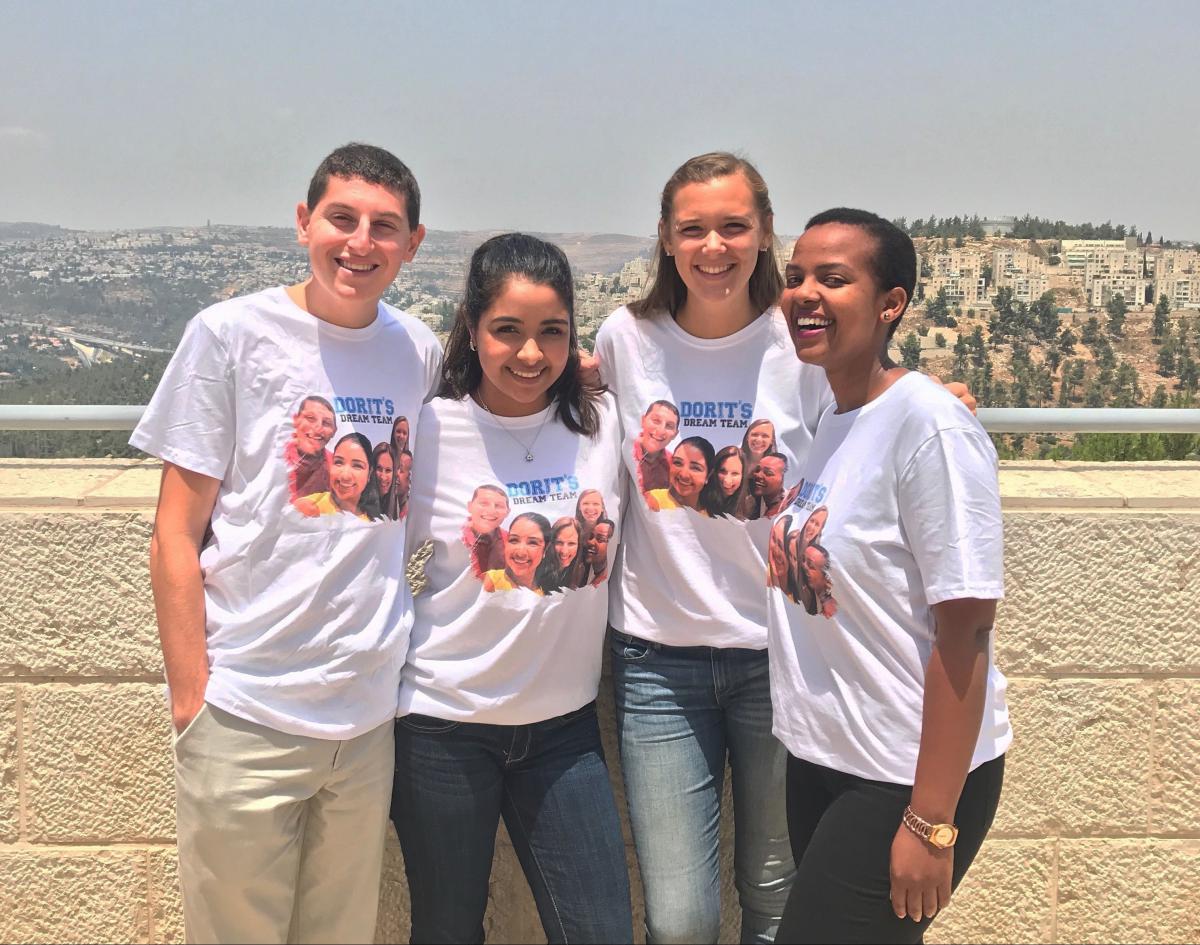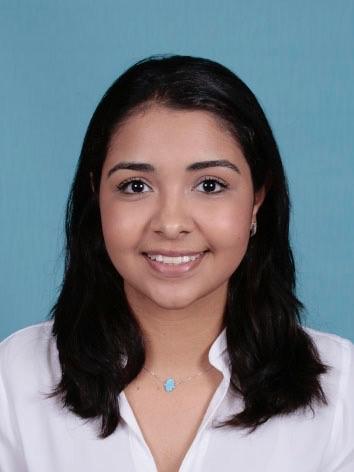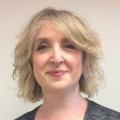
Yad Vashem

Yad Vashem

Yad Vashem

Yad Vashem summer interna Tyler Goldberger together with Holocaust survivor Solly Ganor. Ganor originally from Lithuania was interned at the Dachau concentration camp and in 1945 was liberated by a Nisei soldier Clarence Matsumara.
Over the months of June-August 2017, Yad Vashem's International School for Holocaust Studies welcomed a number of young interns eager to help out in preparing materials and organizing seminars, and looking forward to learning more about the World Center for Holocaust Remembrance in return.
Four of the interns – a Rwandan genocide survivor, and Evangelical Christian, a Latin-American Jewish history student and a former Birthright participant – spoke about their time at the International School, their surprising discoveries and their future plans in light of this once-in-a-lifetime opportunity:
Why did you choose to intern at Yad Vashem?
Liliane Pari Umuhoza: I was two years old during the 1994 genocide against the Tutsis in Rwanda, a tragedy that took a large number of my family. Studying in the US now, I recently had the idea of visiting another nation that had experienced a genocide to learn how they are dealing with the aftermath after a long period of time.
Isabella Perello: Studying History at the University of South Florida, I took a great interest in Holocaust Studies after going to Poland on a Chabad on Campus trip in March. When I got offered an internship in Israel I immediately applied to Yad Vashem.
Tyler Goldberger: I had briefly visited Yad Vashem during my Birthright trip last summer, and I immediately knew that I had not spent a proper amount of time here. I was especially curious to learn about the work at the International School. I received the opportunity of a lifetime through Onward Israel, a program that matches young adults to internships in Israel for two months. There are not enough words to express how fortunate I was to spend a summer learning from some of the top Holocaust experts in the field.
Kaitlyn Hawn: I have been living in Israel since last August because I am getting my master's degree at Jerusalem University College. One of my majors in college was History, and it had been a wish of mine for several years to be involved somehow at a Holocaust museum. It was a dream come true to work at Yad Vashem.
What kind of work did you perform during your internship?
KH: I worked with the International Seminars in English Department at the International School; I helped prepare materials that would be used for the seminars, I edited videos from the [International Jewish Educators'] conference held at the School last December so they could be published online, and I updated the educational materials section of the Yad Vashem website. As an Evangelical Christian, I was also fortunate to actively participate in the Future Christian Leaders' seminar and the 19-day International Seminar for Educators. I went to nearly every lecture of these seminars, and now have an entire notebook full of notes. I also went on many of the trips to different places around Israel as a part of these seminars.
IP: I assisted the Spanish-Speaking Team at the International School – translating and collating material for a weeklong seminar from Spain of 45 participants, the biggest seminar the School has held to date!
TG: Working with the team on the [multimedia teaching tool] "Echoes and Reflections" gave me the opportunity to expand my knowledge of the Holocaust. I was in charge of compiling extensive footage and stills to use on the educational video entitled, “Liberation: The First Moments.” I also helped with the launching of the project's updated website by researching an image to match every timeline entry. All of my work allowed me to gain valuable skills that I will bring back to the United States to continue educating people about the Holocaust.
LPU: I was lucky to be part of the International Seminars Department at the School. I enjoyed the most wonderful working environment that gave me a chance to be part of the seminars by attending and presenting as well. In these seminars, I learned more about the Holocaust, as well as how to teach and tell people about terrible experiences in an appropriate and impactful way.
Did anything surprise you about the work at Yad Vashem?
LPU: I was surprised by the number of people who visit Yad Vashem to learn about the Holocaust and see the museum, and how Yad Vashem manages to welcome them all, and teach them in their different languages. It is so interesting, inspiring and surprising at the same time.
KH: I never expected to form such deep and meaningful relationships this summer. The quality and quantity of relationships I made at Yad Vashem was the most unexpected part the summer. In addition, everything I did served a greater purpose – to teach and educate people about the Holocaust. However, perhaps the most surprising thing about working at Yad Vashem was how much light-heartedness existed among the staff. Yad Vashem and the Holocaust can oftentimes be solely associated with despair and somber feelings. I was expecting to enter a very solemn environment. While everyone at the International School takes their work seriously, the overall atmosphere is not one of despair but of joy and hope for the future, which is what I believe Yad Vashem is all about.
What did you gain from your experience?
IP: The other interns and I became very close friends thanks to such a friendly environment. I also developed skills such as team work and keeping to deadlines, and I gained so much knowledge about the Holocaust that I never dreamed of acquiring.
LPU: My main focus of the internship was to learn about “trauma through generations" – seeing how trauma has affected the generations born after the genocide, and how they have dealt with that issue. Meeting many Holocaust survivors at Yad Vashem and generations born in its wake helped me gain some understanding of this concept. In addition, the lessons I learned in seminars and presentations I gave helped me grow. Sharing my story was a healing process for me as a genocide survivor.
Yad Vashem is known at the World Holocaust Remembrance Center. Why do you think the institution attracts so many educators and visitors each year?
TG: Yad Vashem is unique in its portrayal and remembrance of the Holocaust. Through my school years, the Holocaust was an intangible event; it was hard to relate to the numbers lost and the brutality implemented. However, Yad Vashem approaches the Holocaust by focusing in on the individual and their story, recognizing that one life, plus another life, plus another life eventually adds up to six million Jews. The visual, audio and sensory displays create an environment where everyone can relate to something meaningful that teaches us about the impact of the Holocaust on everyone involved.
IP: The entire Yad Vashem structure is so interesting. Its location, different sections of the campus, and architecture is what makes Yad Vashem such a relevant Holocaust Remembrance Center. Every day when I walked into work, I saw people from all over the world. The Holocaust is part of Jewish history. I believe that everyone who comes to Israel must visit Yad Vashem.
Why do you think Holocaust education and remembrance is still relevant today, over seven decades after the end of WWII?
TG: Unfortunately, we are at a time where hatred still plays a major role in our society. We often end our discussion with the Holocaust by preaching "Never Again," but these words have not been heard by everyone yet. The Rwandan Genocide happened. The Darfur Genocide is happening. The Yazidi Genocide is happening. All of this hatred still exists in the world, and it is our job to educate those on what happens when there was so much hatred for a certain group that it turns into mass murder. The Holocaust needs to be taught to show the pain and loss that occurs when people believe that it is okay to kill others who are not like themselves. I pledge to bring the stories home so that others can realize how important it is to continue talking about the consequences of targeting a specific group of people.
KH: So much of what contributed to allowing the Holocaust to happen stills exists. Antisemitism still exists. Racism still exists. Hatred still exists. Genocide still exists. And man's capacity for tremendous evil still exists. The fact that there was just a rally of white supremacists and neo-Nazis in Charlottesville, Virginia is evidence that Holocaust education and remembrance is still relevant and vital today.
LPU: I believe that by learning from the past we can adjust the present and make the future better. The Holocaust is – and should always be – relevant, in order to prevent such a horrible history from repeating itself. As the great [Holocaust survivor, novelist and Nobel Peace Laureate] Elie Weisel said, “For the dead and the living, we must bear witness." Personally, as a genocide survivor, I would never wish what I experienced on anyone, anywhere else in the world.
How will you keep up your connection with Yad Vashem and Holocaust education in the future?
IP: As an active member of my Jewish community at USF and as a History major with a possible concentration in Holocaust Studies, I will continue to learn, teach and commemorate about the history of the Holocaust to people around me.
LPU: I am already in touch with people I worked with here and I hope to come back because I believe that I still have a lot to learn from Yad Vashem. I am also taking classes about the Holocaust to my college and I am very much interested in this field. Words can’t express my gratitude to Yad Vashem for the wonderful opportunity I had this summer.
KH: Through interning at the International School of Holocaust Studies and getting to participate in different seminars, I was heavily confronted with the deep roots of antisemitism within Christianity. It was the first time that I was presented with all of this information, and I struggled with it. Feelings of guilt, shame, and sadness washed over me. The information caused me to raise many questions that I had never before asked. My hope would be to help educate Christians about the Holocaust and antisemitism. Jewish-Christian relations is something is that near and dear to my heart, but in order for these two groups to be able to come together, Christians need to be educated about the Holocaust and about the history of Christianity with regards to Judaism.
TG: I realized this summer how important voices are in order to share your story and the stories of those who are no longer with us. I want to bring this emphasis on the human voice and the human story back home, so that others can begin to understand the significance of speaking up against those who are being treated unfairly. I plan to come back to Yad Vashem and bring my friends here, so that we can continue an environment that encourages learning and understanding.










